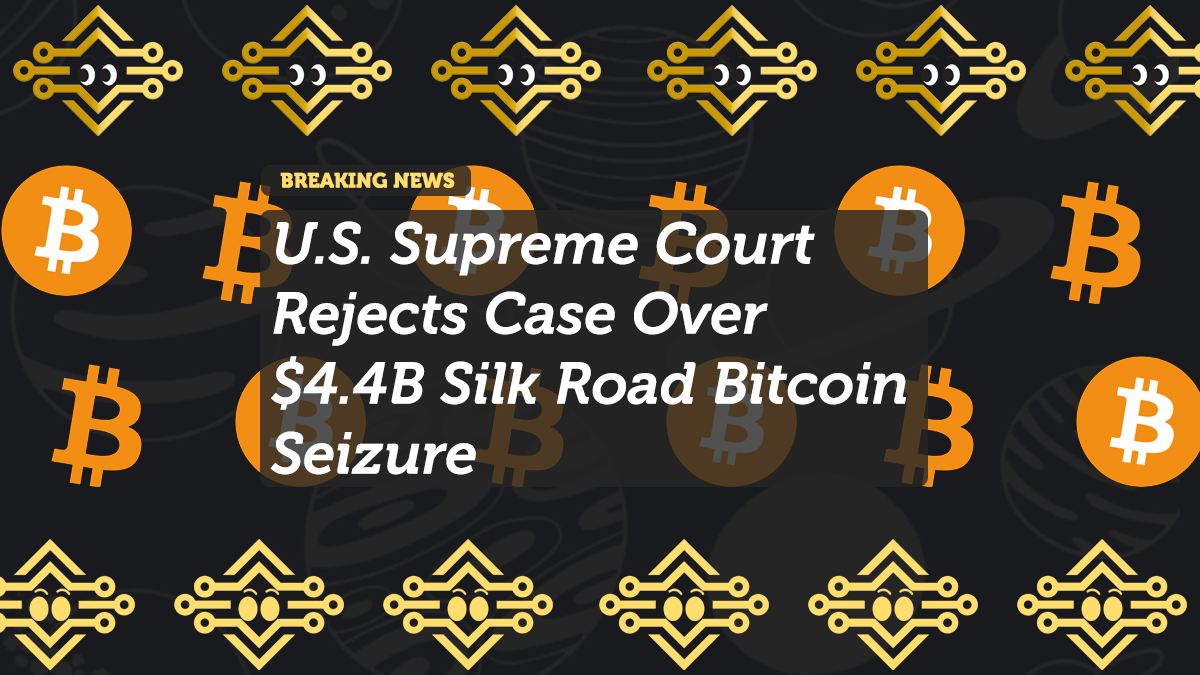
U.S. Supreme Court Rejects Case Over $4.4B Silk Road Bitcoin Seizure
In a significant decision with potential market implications, the U.S. Supreme Court has declined to hear a case concerning 69,370 Bitcoin—worth approximately $4.4 billion—seized from the infamous dark web marketplace, Silk Road. The refusal to review the case, brought by Battle Born Investments, marks a critical moment in the legal battle over ownership of the seized Bitcoin. This decision paves the way for the U.S. government to potentially sell the massive Bitcoin holdings.
With the government’s increasing involvement in offloading seized cryptocurrency, this ruling could introduce further market volatility, while political candidates weigh in on what to do with such large amounts of seized Bitcoin.
The Case: Battle Born Investments’ Claim Over Silk Road Bitcoin
The legal dispute originated with Battle Born Investments, which claimed it had acquired the rights to the 69,370 Bitcoin through a bankruptcy estate. Battle Born asserted that it had the legitimate right to the cryptocurrency that was confiscated by the U.S. government following the shutdown of Silk Road, the notorious dark web marketplace founded by Ross Ulbricht in 2011.
1. Failed Appeals and Legal Setbacks
The case was previously dismissed by lower courts, including a San Francisco appellate court in 2022, which ruled that Battle Born did not have a valid claim to the seized Bitcoin. This ruling effectively nullified their argument that they had acquired the BTC through a bankruptcy claim following the closure of Silk Road in 2013. Battle Born’s subsequent appeal to the U.S. Supreme Court represented a last-ditch effort to reclaim the billions in Bitcoin.
However, the Supreme Court’s decision to not take up the case essentially ends Battle Born’s legal efforts, clearing the way for the government to move forward with its plans.
2. U.S. Government’s Civil Forfeiture
The U.S. government had initiated a civil forfeiture action against the Bitcoin, claiming that the funds were tied to illicit activities facilitated by the Silk Road platform. With the Supreme Court’s refusal to review the case, the government’s forfeiture action is now likely to succeed, allowing it to take full control of the seized Bitcoin.
Potential Sale of the Seized Bitcoin: Market Impact and Volatility
With the legal hurdles removed, the U.S. government now has the option to sell the 69,370 Bitcoin. This could potentially result in significant market movements, as large government sales of Bitcoin have previously contributed to market volatility.
1. Previous Government Bitcoin Sales
The U.S. government is no stranger to auctioning off seized cryptocurrency. In July 2024, the government moved around $2 billion worth of Bitcoin, also linked to Silk Road, through transfers managed by the U.S. Marshals Service using Coinbase Prime for custody. These types of sales have led to market disruptions before, as seen earlier in 2024 when the German government offloaded approximately 50,000 Bitcoin—worth over $3.15 billion—in just a few weeks, contributing to short-term volatility.
2. What Will the U.S. Government Do With the Bitcoin?
While it remains unclear how the U.S. government plans to handle this particular Bitcoin stash, the decision will have substantial implications for the broader cryptocurrency market. If the government chooses to sell the Bitcoin gradually, it may help to minimize volatility. On the other hand, a large one-time sale could flood the market with supply, likely driving down Bitcoin prices.
Political Stakes: What Presidential Candidates Say About Seized Bitcoin
The decision on what to do with the seized Bitcoin has also become a political issue, with major U.S. presidential candidates weighing in on how they would handle such assets.
1. Donald Trump’s Plan: Strategic Bitcoin Stockpile
Republican presidential candidate Donald Trump has taken an interest in the issue of seized cryptocurrency. He has pledged that, if elected, he would build a “strategic Bitcoin stockpile”, treating it similarly to how the U.S. holds gold reserves. Trump has also promised to release Ross Ulbricht, the founder of Silk Road, who is currently serving a life sentence for his role in operating the dark web marketplace.
Trump’s proposal to build a strategic Bitcoin reserve could signal a shift in how the U.S. government views cryptocurrency as a national asset.
2. Kamala Harris and the Democrats
On the other hand, Democratic presidential candidate Kamala Harris has not yet publicly stated her plans for handling seized cryptocurrency. The lack of a clear stance leaves room for speculation about how a Harris administration might approach the issue, whether through sales, regulation, or integrating the assets into the U.S. financial system.
The Silk Road Legacy: A Dark Chapter in Crypto’s History
The Silk Road case remains one of the most infamous moments in the history of cryptocurrency, bringing attention to both the potential of Bitcoin as a decentralized currency and its misuse for illegal activities. Silk Road, which facilitated drug sales, money laundering, and other illicit activities, was shut down in 2013 by federal authorities, and its founder, Ross Ulbricht, was arrested and eventually sentenced to life in prison.
The Bitcoin seized in the Silk Road case has been at the center of legal battles and continues to raise important questions about the relationship between cryptocurrency, crime, and the government.
Conclusion: What’s Next for the $4.4B in Seized Bitcoin?
With the U.S. Supreme Court’s refusal to hear Battle Born Investments’ case, the legal pathway is now clear for the government to claim and potentially sell the 69,370 Bitcoin seized from the Silk Road. This decision not only ends a long legal battle but also brings the possibility of market volatility as the U.S. government decides how to handle such a significant stash of Bitcoin.
As the U.S. government weighs its options, the crypto community will be watching closely to see how the sale or retention of this Bitcoin affects market prices, political discourse, and the future of government-held crypto.
The final resolution of this case will likely influence not just the crypto market, but also the broader conversation about government involvement in cryptocurrency.
















